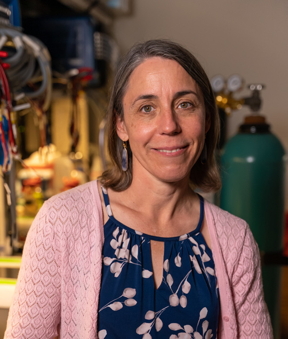Home > Press > Rice University launches Rice Synthetic Biology Institute to improve lives
 |
| Caroline Ajo-Franklin, director of the Rice Synthetic Biology Institute
Credit: Rice University |
Abstract:
Rice University has launched the Rice Synthetic Biology Institute, which aims to catalyze collaborative research in synthetic biology and its translation into technologies that benefit society.
Rice University launches Rice Synthetic Biology Institute to improve lives
Houston, TX | Posted on January 12th, 2024
The Rice Synthetic Biology Institute demonstrates how everyone benefits when the top minds in natural sciences and engineering collaborate at a leading research university, said President Reginald DesRoches. This research institute will draw global attention to the great work that is happening in our highly regarded synthetic biology program at Rice and it will help us continue to attract and retain the best talent in the field.
Synthetic biology is an interdisciplinary discipline where researchers design living systems with new properties to address societal needs. With more than 18 faculty and over 100 students and postdoctoral scholars across the Schools of Engineering and Natural Sciences connected to this expanding field, RSBI plans to strengthen this community at Rice, connect basic and translational research, and elevate Rices international visibility in this space. This follows a 2018 university investment in strategic initiatives aimed at propelling faculty and programs supporting synthetic biology.
The institute is led by Caroline Ajo-Franklin, professor of biosciences, bioengineering, and chemical and biomolecular engineering, with the support of an interdisciplinary faculty steering committee.
At Rice, we have such deep expertise in synthetic biology, said Ajo-Franklin. Connecting that deep expertise through this institute will lead to better science and more innovation.
Rice University is an amazing place to learn, teach, research and innovate, said Ramamoorthy Ramesh, executive vice president for research. The Rice Synthetic Biology Institute will ensure that our researchers are recognized on the international stage for the life-changing work they are doing in Houston and around the world.
The institute will support research to understand how to design new types of living systems for applications in medicine, manufacturing and environmental sustainability. Four research themes will be the initial focus of RSBI, leveraging Rices unique strengths:
Controlling the biological synthesis and patterning of proteins and cells into living materials that self-replicate and self-repair across a range of length scales
Understanding cells as natural sensors and repurposing them into living therapeutics to detect and treat diseases, maintain health and prevent infections
Developing living electronics to convert biochemical information into information-dense electronic signals in real time at the cell-material interface
Supporting cross-cutting scholarship aimed at accelerating the Design-Build-Test-Learn cycle and understanding the ethical, legal and social implications of translating these technologies into the public domain.
####
About Rice University
To learn more about the Rice Synthetic Biology Institute, visit https://synbio.rice.edu/ .
For more information, please click here
Contacts:
Amy McCaig
Rice University
Office: 713-348-6777
Copyright © Rice University
If you have a comment, please Contact us.
Issuers of news releases, not 7th Wave, Inc. or Nanotechnology Now, are solely responsible for the accuracy of the content.
News and information
![]()
Researchers develop technique to synthesize water-soluble alloy nanoclusters January 12th, 2024
![]()
Development of zinc oxide nanopagoda array photoelectrode: photoelectrochemical water-splitting hydrogen production January 12th, 2024
Synthetic Biology
![]()
The medicine of the future could be artificial life forms October 6th, 2023
![]()
Bioinformatics tool accurately tracks synthetic: DNA Computer scientists show benefits of bioinformatics with PlasmidHawk February 26th, 2021
Possible Futures
![]()
Focused ion beam technology: A single tool for a wide range of applications January 12th, 2024
![]()
‘Sudden death’ of quantum fluctuations defies current theories of superconductivity: Study challenges the conventional wisdom of superconducting quantum transitions January 12th, 2024
Academic/Education
![]()
Multi-institution, $4.6 million NSF grant to fund nanotechnology training September 9th, 2022
![]()
Lifeboat Foundation Guardian Winner Jeff Bezos Donates One Million to Lifeboat Foundation Dream Project Winner Teachers in Space July 30th, 2021
Announcements
![]()
Researchers develop technique to synthesize water-soluble alloy nanoclusters January 12th, 2024
![]()
Scientists use heat to create transformations between skyrmions and antiskyrmions January 12th, 2024
![]()
Bridging light and electrons January 12th, 2024










